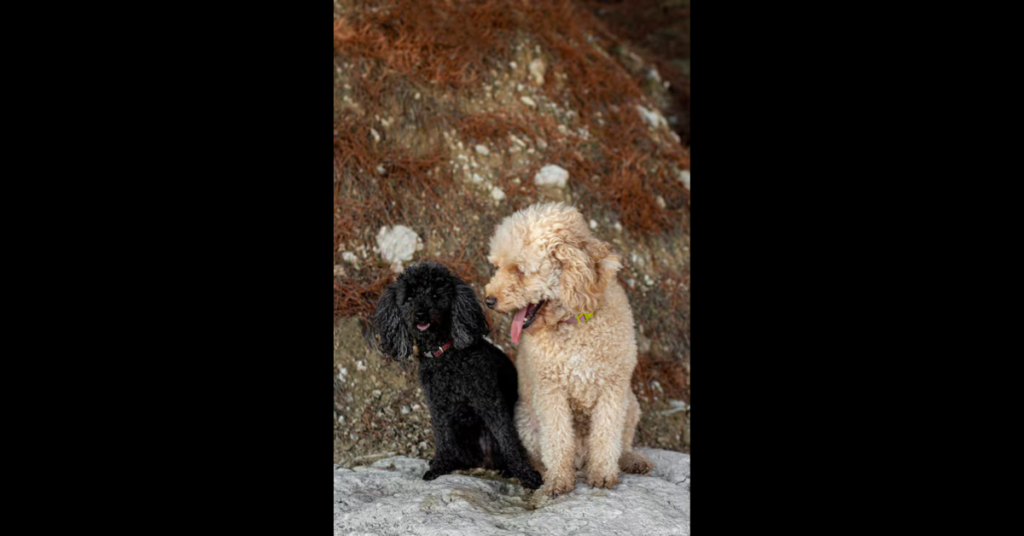The world of dog breeding has introduced many unique and fascinating breeds, none perhaps more intriguing than the Goldendoodle. A hybrid between a Golden Retriever and a Poodle, this breed has become immensely popular due to its temperament, intelligence, and hypoallergenic coat. One of the rarer and more striking varieties is the Black Goldendoodle, a captivating version that has become increasingly sought after by dog lovers. In this guide, we’ll delve into the history, characteristics, care, and everything else you need to know about owning a Black Goldendoodle.
Chapter 1: History of the Goldendoodle
The Goldendoodle is part of a larger trend of “designer dogs” that began to gain traction in the late 20th century. The aim of crossbreeding was often to combine the best traits of two beloved breeds. The idea behind the Goldendoodle was to merge the Poodle’s hypoallergenic qualities with the Golden Retriever’s friendly and loyal temperament.
The hybridization process began in the 1990s, when breeders sought to create a dog that had the low-shedding fur of the Poodle but maintained the gentle and friendly nature of the Golden Retriever. Initially, the breed was developed for use as a guide dog, but soon, its other desirable traits — including trainability, intelligence, and adaptability — made it popular among families and individuals alike.
Though Goldendoodles can come in various sizes and coat colors, ranging from cream to apricot, one of the more unique variations is the Black Goldendoodle. This version occurs when the Poodle parent contributes a dominant black gene, overshadowing the typically lighter coat of the Golden Retriever parent.
Chapter 2: Genetics Behind the Black Goldendoodle
The coat color of a Goldendoodle is determined by a complex interplay of genetics from both parent breeds. In most cases, Golden Retrievers have a reddish or light-colored coat, while Poodles come in a wide variety of shades, including black, white, apricot, and gray.
For a Black Goldendoodle to be born, the dominant black gene from the Poodle parent must override the coat color gene of the Golden Retriever. The result is a deep, rich black coat that stands out as a rarity among the more commonly seen gold and cream varieties.
It is important to note that even though the coat is black, a Black Goldendoodle still shares the same qualities and traits as any other Goldendoodle. The black coat does not affect the dog’s temperament, intelligence, or health, but it does make the dog visually striking and often more desirable to certain owners.
Chapter 3: Physical Characteristics of a Black Goldendoodle
1. Size and Weight
The size of a Black Goldendoodle can vary greatly depending on the size of the Poodle parent, which can be a standard, miniature, or toy Poodle. As a result, you can find Black Goldendoodles that range from 15 to 90 pounds.
- Standard Black Goldendoodle: Typically weighs between 50-90 pounds and stands around 20-26 inches tall.
- Miniature Black Goldendoodle: Weighs between 15-35 pounds and stands about 13-20 inches tall.
- Toy Black Goldendoodle: Weighs less than 15 pounds and stands around 10-15 inches tall.
2. Coat Type
The coat of a Black Goldendoodle can be straight, wavy, or curly. This, again, is largely dependent on which parent the dog takes after more. Poodles have curly, hypoallergenic coats, while Golden Retrievers have straight or wavy coats. A mix of these results in a low-shedding, hypoallergenic coat, although not all Goldendoodles are guaranteed to be entirely hypoallergenic.
Curly-coated Black Goldendoodles are more likely to be hypoallergenic, while those with straighter or wavier coats may shed a little more. However, compared to other breeds, even the straight-coated Goldendoodle will shed significantly less than a typical Golden Retriever.
3. Eye and Nose Color
Black Goldendoodles often have dark brown or amber-colored eyes, which stand out against their dark coat. Their noses are typically black, complementing their overall appearance.
4. Body Build
Black Goldendoodles generally have a sturdy, athletic build, with long legs and a balanced body. Their tails can be straight or slightly curled, and their ears are often floppy, adding to their endearing look.
Chapter 4: Temperament and Personality
One of the most significant reasons for the popularity of Goldendoodles is their exceptional temperament. The Black Goldendoodle, like other variations, is known for its friendly, outgoing, and highly intelligent nature. They tend to inherit the best qualities from both the Golden Retriever and Poodle.
1. Intelligence
Both Golden Retrievers and Poodles are among the most intelligent dog breeds, so it’s no surprise that Goldendoodles are highly trainable. Black Goldendoodles are quick learners and often excel in obedience training. They are also highly adaptable and can easily learn to perform a variety of tasks, making them suitable for roles as service dogs, therapy dogs, or simply well-behaved family pets.
2. Affectionate Nature
Black Goldendoodles are extremely affectionate and tend to bond closely with their families. They love to be around people and are known for being great with children. Their gentle and patient nature makes them ideal companions for families, especially those with young kids.
3. Sociability
These dogs are generally very social and get along well with other pets. Whether you have other dogs, cats, or smaller animals, a Black Goldendoodle is likely to be friendly and welcoming. They thrive in environments where they have plenty of social interaction, whether with humans or other animals.
4. Energy Levels
While Black Goldendoodles are energetic, they are also adaptable to various living situations. They do require regular exercise, including walks, playtime, or trips to the dog park, but they also enjoy relaxing at home with their owners. As long as their physical and mental stimulation needs are met, they can be content in both apartment living and larger homes with backyards.
Chapter 5: Grooming and Care for a Black Goldendoodle
Caring for a Black Goldendoodle involves regular grooming, a balanced diet, exercise, and routine veterinary visits. While Goldendoodles are known for their low-shedding coats, they still require consistent care to keep their fur healthy and mat-free.
1. Coat Maintenance
Black Goldendoodles, especially those with curly coats, need regular brushing to prevent tangling and matting. A daily or every-other-day brushing schedule is ideal. For wavy or straight-coated Goldendoodles, brushing once or twice a week may suffice.
Many owners also opt for professional grooming every 6 to 8 weeks to keep their Black Goldendoodle’s coat in top shape. A professional groomer can help trim their fur, clean their ears, and keep their nails clipped.
2. Bathing
These dogs do not need frequent bathing unless they get particularly dirty. Over-bathing can strip their coat of its natural oils, which can lead to dry skin. Aim to bathe your Black Goldendoodle once every couple of months, or as needed.
3. Dental Care
Like all dogs, Black Goldendoodles require regular dental care. Brushing their teeth several times a week can help prevent dental issues such as plaque buildup and gum disease. Dental chews can also be helpful in maintaining oral hygiene.
4. Exercise Requirements
Black Goldendoodles are active dogs that need daily exercise. A couple of walks a day, combined with playtime and mental stimulation, will help keep your dog healthy and happy. They enjoy activities like fetch, running, and swimming, and they are excellent candidates for agility training or other dog sports.
5. Diet and Nutrition
A Black Goldendoodle’s diet should consist of high-quality dog food, either commercially available or homemade (with your vet’s guidance). Since they come in different sizes, their dietary needs will vary depending on their weight and energy levels.
Puppies should be fed more frequently, while adult dogs typically eat two meals per day. Make sure their diet is balanced, with the right mix of proteins, fats, and carbohydrates to maintain their overall health.
Chapter 6: Health Concerns in Black Goldendoodles
While Goldendoodles are generally healthy dogs, they can still be prone to certain genetic health issues, especially if not bred responsibly. Here are some health concerns to be aware of:
1. Hip Dysplasia
This condition is common in both Poodles and Golden Retrievers and can be passed down to Goldendoodles. Hip dysplasia occurs when the hip joint doesn’t develop properly, leading to pain and mobility issues. Regular check-ups with your vet and ensuring your dog maintains a healthy weight can help reduce the risk.
2. Progressive Retinal Atrophy (PRA)
PRA is an inherited eye disorder that can lead to blindness. Both Poodles and Golden Retrievers can carry this genetic condition, so it’s important to get your Black Goldendoodle from a breeder who tests for this disorder.
3. Allergies
Like many dogs, Black Goldendoodles can develop allergies to food, environmental factors, or certain materials. Signs of allergies include excessive scratching, licking, and ear infections. Your vet can help determine the cause and recommend treatment.
4. Ear Infections
Goldendoodles have floppy ears, which can make them prone to ear infections if not properly cared for. Regular ear cleaning can help prevent infections, especially if your dog enjoys swimming or gets wet often.
5. Gastric Dilatation-Volvulus (GDV)
Also known as bloat, GDV is a serious condition that can affect larger dogs, particularly those with deep chests. It occurs when the stomach fills with gas and twists, cutting off blood flow to the stomach and other organs. Immediate veterinary care is required for this condition.
Chapter 7: Training and Socialization
1. Basic Obedience
Black Goldendoodles are highly intelligent and eager to please, making them relatively easy to train. Starting basic obedience training as early as possible is important to establish good behavior. Commands like sit, stay, come, and down can be taught with consistency and positive reinforcement.
2. Crate Training
Crate training can be a useful tool for housebreaking and ensuring your Black Goldendoodle feels safe and secure when you’re not home. Make sure the crate is a comfortable and inviting space where your dog can relax.
3. Socialization
Introducing your Black Goldendoodle to new people, animals, and environments at an early age can help them develop into a well-rounded, confident dog. Regular visits to the dog park, walking in different areas, and inviting friends and family over can help with socialization.
Chapter 8: Is a Black Goldendoodle Right for You?
Before deciding to bring a Black Goldendoodle into your home, it’s important to assess whether this breed is the right fit for your lifestyle. Consider the following:
1. Time Commitment
Black Goldendoodles require regular exercise, grooming, and social interaction. If you have a busy schedule or cannot dedicate time to caring for a dog, this breed may not be the best fit for you.
2. Allergies
While Black Goldendoodles are often considered hypoallergenic, not every dog will be completely allergy-friendly. If you or a family member has allergies, spend some time around the breed before making a commitment.
3. Space
Though adaptable, Black Goldendoodles do best in homes where they have space to move around. If you live in an apartment, you’ll need to make sure you can provide them with enough daily exercise.
4. Family Dynamics
Black Goldendoodles are excellent with children and other pets, making them a great choice for families. However, they do best in homes where they are included in family activities and not left alone for long periods.
Chapter 9: Finding a Black Goldendoodle
1. Reputable Breeders
When looking for a Black Goldendoodle, it’s important to find a reputable breeder who prioritizes the health and well-being of their dogs. Avoid puppy mills or breeders who cannot provide health clearances for the parent dogs.
2. Adoption
Another option is to adopt a Goldendoodle from a rescue or shelter. Many dogs, including Goldendoodles, are in need of loving homes, and adopting can be a rewarding experience.
3. Cost
Black Goldendoodles, like all designer breeds, can be expensive. Prices vary based on the breeder, location, and size of the dog, with costs ranging from $1,500 to $5,000. Make sure to budget not just for the initial purchase but also for ongoing costs like food, grooming, and veterinary care.
Conclusion
The Black Goldendoodle is a beautiful, intelligent, and loyal companion that offers the best of both the Poodle and Golden Retriever worlds. Whether you’re looking for a family pet, a service animal, or simply a furry friend to brighten your days, this breed has the potential to enrich your life in countless ways. However, owning a Black Goldendoodle comes with responsibilities, from grooming to training, and it’s essential to be prepared for the commitment. With proper care and love, a Black Goldendoodle can be a cherished member of your family for many years.







